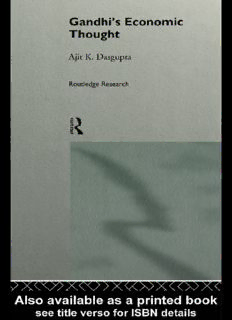
Gandhi's Economic Thought (Routledge Studies in the History of Economics, 10) PDF
Preview Gandhi's Economic Thought (Routledge Studies in the History of Economics, 10)
GANDHI’S ECONOMIC THOUGHT Do Gandhi’s economic writings deal with the problems of the real world, or merely describe a dream of utopia? Mohandas Karamchand Gandhi was not an academic but the charismatic leader of the Indian national movement. He was inspired by a vision of swaraj (self-government), which, for him, meant not just freedom from colonial rule but the achievement of self-reliance and self-respect by the villagers who make up most of India’s population. His economics was a part of this vision. This volume examines Gandhi’s economic theories in areas that include: (cid:127) consumption behaviour; (cid:127) industrialisation, technology and the scale of production; (cid:127) trusteeship and industrial relations; (cid:127) work and leisure; and (cid:127) education as human capital. This is a clearly written and well-researched study of Gandhi’s economic thoughts that will be of interest not only to economists and social scientists, but also to anyone interested in Gandhi. Ajit K.Dasgupta was educated at Presidency College, Calcutta, and Magdalene College, Cambridge. He has taught economics at universities in India, Britain, Canada, Australia and New Zealand and is an Emeritus Professor of the University of Otago. He is the author of A History of Indian Economic Thought. ROUTLEDGE STUDIES IN THE HISTORY OF ECONOMICS 1 ECONOMICS AS LITERATURE Willie Henderson 2 SOCIALISM AND MARGINALISM IN ECONOMICS 1870–1930 Edited by Ian Steedman 3 HAYEK’S POLITICAL ECONOMY The Socio-economics of Order Steve Fleetwood 4 ON THE ORIGINS OF CLASSICAL ECONOMICS Distribution and Value from William Petty to Adam Smith Tony Aspromourgos 5 THE ECONOMICS OF JOAN ROBINSON Edited by Maria Cristina Marcuzzo, Luigi Pasinetti and Alesandro Roncaglia 6 THE EVOLUTIONIST ECONOMICS OF LEON WALRAS Albert Jolink 7 KEYNES AND THE ‘CLASSICS’ A Study in Language, Epistemology and Mistaken Identities Micel Verdon 8 THE HISTORY OF GAME THEORY, VOLUME 1 From the Beginnings to 1945 Mary Ann Dimand and Robert W.Dimand 9 THE ECONOMICS OF W.S.JEVONS Sandra Peart 10 GANDHI’S ECONOMIC THOUGHT Ajit K.Dasgupta GANDHI’S ECONOMIC THOUGHT Ajit K.Dasgupta London and New York First published 1996 by Routledge 11 New Fetter Lane, London EC4P 4EE This edition published in the Taylor & Francis e-Library, 2003. Simultaneously published in the USA and Canada by Routledge 29 West 35th Street, New York, NY 10001 © 1996 Ajit K.Dasgupta All rights reserved. No part of this book may be reprinted or reproduced or utilized in any form or by any electronic, mechanical, or other means, now known or hereafter invented, including photocopying and recording, or in any information storage or retrieval system, without permission in writing from the publishers. British Library Cataloguing in Publication Data A catalogue record for this book is available from the British Library Library of Congress Cataloguing in Publication Data Dasgupta, Ajit Kumar. Gandhi’s economic thought/Ajit K.Dasgupta p. cm.—(Routledge studies in the history of economics) Includes bibliographical references and index. 1. Gandhi, Mahatma, 1869–1948—Views on economics. 2. Gandhi, Mahatma, 1869–1948—Political and social views. 3. Economics—India. I.—Title. II. Series. HB126.I43G394 1996 330.1–dc20 96–10733 CIP ISBN 0-203-46322-6 Master e-book ISBN ISBN 0-203-46891-0 (Adobe eReader Format) ISBN 0–415–11430–6 (Print Edition) To Sipra with love CONTENTS Acknowledgements ix 1 INTRODUCTION 1 Utopia and reality in Gandhian economics 2 Gandhi’s religion 3 Economics and ethics 6 Gandhi and ethical theory 7 2 PREFERENCE, UTILITY AND WELFARE 13 Introduction 13 The limitation of wants 14 Ethical preferences and Swadeshi 21 Altruism and charity 30 Work, leisure and the doctrine of bread-labour 36 3 RIGHTS 44 Rights and duties 45 Some specific cases 46 A resolution on rights 50 A summing up 53 4 INDUSTRIALISATION, TECHNOLOGY AND THE SCALE OF PRODUCTION 64 Gandhi vs Ranade 64 The case against industrialisation 68 Some qualifications 76 Conclusion 80 vii CONTENTS 5 INEQUALITY 88 Equality as respect 88 Economic inequality 91 Inequality, untouchability and the caste system 93 Gender inequality 104 6 THE THEORY OF TRUSTEESHIP 118 The theory explained 118 Trusteeship and the law of trusts 123 Trusteeship and industrial relations 125 Trusteeship and landlordism 126 Conclusion 129 7 EDUCATION 132 Introduction 132 Aims of education 136 Nayee Talim 140 Why schools should be self-supporting 143 Higher education 146 Conclusion 150 8 SPECIAL TOPICS 155 Population policy 155 Gandhi’s predecessors 163 9 THE LEGACY OF GANDHI 174 The impact of Gandhi on Indian economic policy 174 Ethics and economics 176 Gandhi and rural development 178 Some methodological issues 181 Notes 184 Index 203 viii ACKNOWLEDGEMENTS I have benefited by discussion with, or comments from, Bina Agarwal, D.P.Chaudhri, Sipra Dasgupta, Danielle Pender and Joe Wallis. I am grateful to Jeanne Skinner, who prepared the manuscript for the press with care, skill and patience, and to Rujbir Kaur Pabla, who helped with the proof-reading. ix
Description: